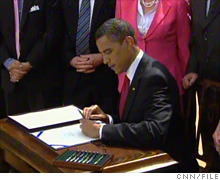Obama signs credit card crackdown
New law will curtail fees and rate hikes starting in February. Industry opposition fell under populist push, culminating year's long drive by consumers.
 |
| President Obama said credit card bill 'will make a big difference.' |
WASHINGTON (CNNMoney.com) -- President Obama signed a bill on Friday that makes it tougher for credit card issuers to raise fees and interest rates.
During a bill-signing ceremony at the White House, President Obama praised the new law, which was the culmination of several years of work by consumer groups and Democrats to rein in what they say are abusive practices that prey on consumers.
"We're here today for a bill that will make a big difference," said Obama.
Obama was joined by, among others, the bill's Democratic sponsors: Sen. Chris Dodd of Connecticut and Rep. Carolyn Maloney of New York. Sen. Richard Shelby of Alabama, a top Senate Republican who negotiated a final deal to pass the bill, also attended.
The House and Senate passed the legislation by overwhelming bipartisan margins earlier this week, despite strong objections by banking industry advocates who say it could result in tightened credit to Americans.
Shares of American Express (AXP, Fortune 500), Capital One (COF, Fortune 500) and Discover Financial (DFS, Fortune 500) traded lower on Friday.
The law also includes an unrelated measure allowing people to carry guns into national parks.
The credit card rules would take effect in February 2010 and are not retroactive, meaning consumers could still face rate hikes until then.
The rules makes it harder for people under age 21 to get credit cards. It would also ban rate hikes unless a consumer is more than 60 days late -- and then restore the previous rate after six months if minimum payments are made.
The bill marks a major loss for the banking industry.
Financial services representatives have decried the bill, saying it would exacerbate the credit crisis and force banks to drop some risky credit card holders. The American Bankers Association said the legislation would prompt banks to reinstate annual fees and higher interest rates for all card holders, an outcome that would penalize those with good credit who pay their bills on time.
President Obama said the bill was not designed to protect those who have been fiscally irresponsible, and that credit card companies deserve to make a profit.
"We do not excuse those, and do not condone folks who have acted irresponsibly," he said.
The credit card legislation has been a long work in progress. The House passed a bill in 2008 and again earlier this year. The legislation, which stalled in past years, was propelled by public outrage and pressure by President Obama. For example, President Obama held a special town hall meeting in New Mexico last week to highlight the problems of high fees and interest rates.
Nearly 80% of American families have a credit card, and 44% of families carry a balance on their credit cards, according to the White House.
In recent months, credit card companies have been raising fees and interest rates. From November 2008 to February 2009, rates increased from an average to 13.08% from 12.02%, according to a Federal Reserve Board report.
At the same time, more people are not able to make their credit cards payments and are walking away from debt, according to a Federal Reserve report.
During the speech, President Obama gave a special "shout-out" to Sen. Dodd and pointed out several times how Republicans had worked with Democrats on the bill. ![]()


